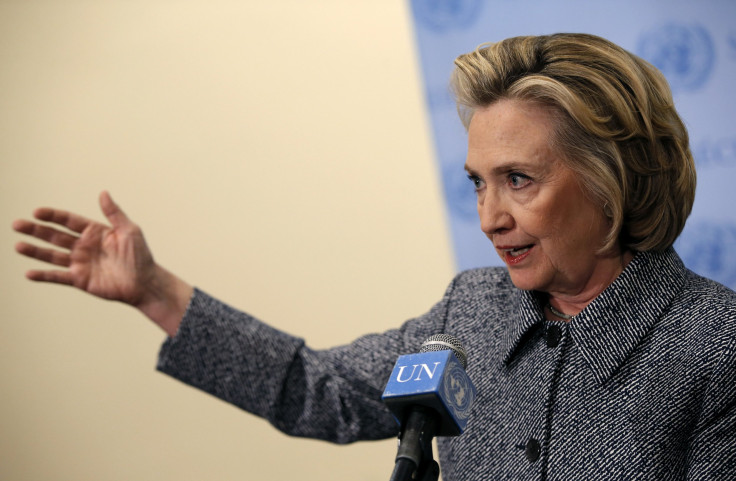Hillary Clinton Email Scandal: Press Conference 'Did Not Staunch The Bleeding'

Former Secretary of State Hillary Clinton attempted to put the latest controversy behind her by addressing the media Tuesday regarding her use of her private email account to conduct State Department business. But her “convenience” explanation -- namely, that she thought it would be easier to use one device for both her private and public email communications using the same account -- wasn’t sufficient, according to political observers.
“She did not staunch the bleeding,” George Arzt, who runs a New York City communications firm and served as press secretary for late New York City Mayor Ed Koch, said. “This is a story that will continue to run because there’s so many holes in Hillary’s defense yesterday and it doesn’t match up with previous statements.”
Clinton’s explanation left many questions unanswered, including why she couldn’t use her phone to access a private and a State Department email address and why she said she didn’t want to use more than one device despite a previous interview where she claimed to have an iPad Mini, an iPad, an iPhone and a BlackBerry. She also said she would not be turning over the private email server connected to her account, arguing that the server “contains personal communications from my husband and me.” That statement ran contrary to reports that former President Bill Clinton only sent two emails in his life, both when he was commander in chief. Clinton spokesman Nick Merrill and former Clinton aide Philippe Reines didn’t respond to a request for comment.
Clinton’s handling of the press conference indicated that her handlers didn’t properly prepare her, Arzt said. The media preparation should have included questions to Clinton that would have been tougher than the reporters’, but that wasn’t the case, he said. “They should’ve gone over previous statements, they should have done a prep from inside knowledge, asking tough questions. The press secretary should have known what was on the reporters’ minds, what kind of questions she might get and to answer their questions upfront in [the] statement and be ready for tougher questions later on,” he said.
The scrutiny on Clinton is intense considering she is currently the likely Democratic nominee for president in 2016, even though she has yet to officially announce a campaign. Meanwhile, two of Clinton’s possible opponents in a Democratic primary haven’t attacked her on the email controversy. Former Maryland Gov. Martin O’Malley said he didn’t watch the press conference, so he couldn’t respond to it. O'Malley added that he was “a little sick of the email drama.” And former U.S. Sen. Jim Webb of Virgina, who formed a presidential exploratory committee, declined to give his personal opinion on the flap, telling NBC News that the matter was “between her and you all,” referring to the media.
The reluctance on the part of Webb and O’Malley to go after Clinton isn’t unusual given their low standings in the polls. Both men were polling at 1 percent support, while Clinton dwarfed the prospective 2016 Democratic field at 60 percent in a McClatchy-Marist Poll released Monday. Vice President Joe Biden was a distant second with 13 percent, followed by U.S. Sen. Elizabeth Warren of Massachusetts, who has repeatedly said she isn’t running, at 12 percent, and U.S. Sen. Bernie Sanders, I-Vt., at 5 percent.
“I don’t think that O’Malley or Elizabeth Warren or any potential opponent will do anything to undermine Hillary at this point,” Arzt said. “They attack her, and they lose massive support among Democrats and contributors.”
Chris Arterton, a professor of political management at the Graduate School of Political Management at George Washington University in Washignton, D.C., said Clinton is too strong for a serious primary challenger to develop.
But Republicans, who have long accused the Clintons of being secretive and opaque, are pouncing on the revelations. The party called the press conference “a huge disappointment for the American people” in a statement released Wednesday. “In classic Clintonian fashion, she refused to apologize for any wrongdoing, failed to be honest or candid, and above all, refuses further disclosure,” the statement went on to say. “Now we’re left with more questions than answers.”
While Republicans are homing in on the email controversy now, the attacks may not have staying power should Clinton become the Democratic nominee, Arzt argued. "As long as the Republicans continue, it becomes a partisan issue, and it loses its effect after a while," he said.
Arterton said the Clinton campaign is fortunate that the story came out now as opposed to months before the election. "It has been a time bomb waiting to go off. In 18 months it will be old news," he said.
© Copyright IBTimes 2025. All rights reserved.






















